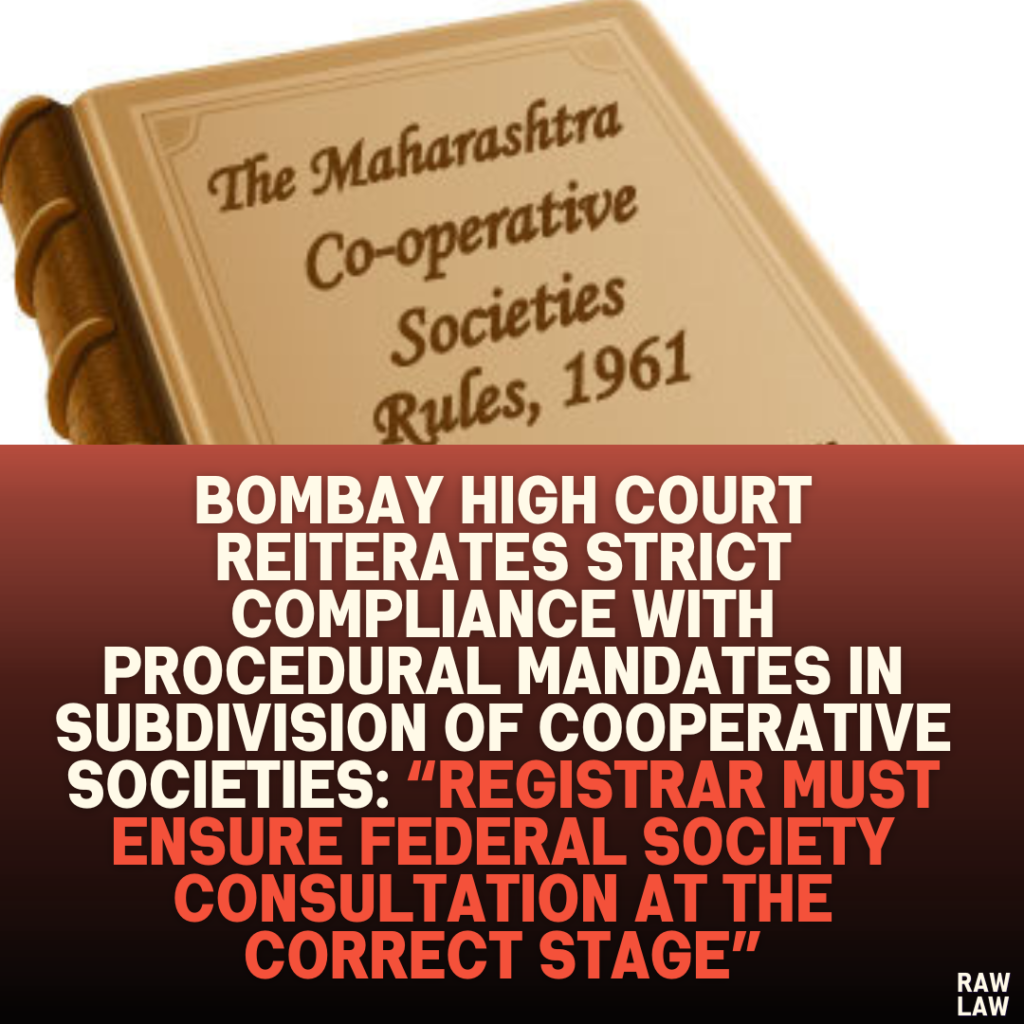Court’s Decision:
The Bombay High Court quashed the orders for subdivision passed by the Deputy Registrar, Divisional Joint Registrar, and Minister-Cooperation, citing procedural non-compliance. It emphasized that the failure to consult the Federal Society at the correct stage, as per Rule 17 of the Maharashtra Cooperative Societies Rules, 1961, rendered the orders invalid.
Facts:
- Background of the Society:
- The Maharashtra Housing Board constructed 18 blocks in Goregaon, Mumbai, in 1960 to provide affordable housing for the economically weaker sections.
- Ownership of these tenements was transferred to residents in 1996, leading to the formation of the petitioner society.
- Redevelopment and Opposition:
- In 2015, the petitioner society resolved to redevelop the blocks. A resolution was passed in 2022 to appoint a private developer.
- A minority of members opposed the redevelopment plan, seeking to undertake self-development of their respective blocks.
- Subdivision Process:
- Applications for subdivision were submitted by members opposing the redevelopment in April 2023.
- The Deputy Registrar issued draft orders for subdivision in April 2023, consulted the Federal Society later in September 2023, and finalized the subdivision orders the same month.
- Two new societies, comprising six blocks, were formed under the subdivision orders.
- Challenges by the Petitioner Society:
- The petitioner society appealed against the subdivision orders, which were dismissed by the Divisional Joint Registrar and Minister-Cooperation.
- The present writ petition was filed before the Bombay High Court.
Issues:
- Procedural Compliance:
- Whether the Registrar followed the correct sequence for consulting the Federal Society as mandated by Rule 17.
- Validity of Subdivision:
- Whether the procedural irregularity invalidates the subdivision orders.
Petitioner’s Arguments:
- Procedural Violation:
- Rule 17 of the Maharashtra Cooperative Societies Rules mandates consultation with the Federal Society before preparing and issuing the draft order. In this case, the consultation occurred after the draft order was served on the petitioner.
- Undermining Majority Decision:
- Subdivision was used as an indirect means to oppose redevelopment supported by the majority of members.
- Invalidity of Orders:
- Procedural non-compliance rendered the subdivision orders void ab initio.
Respondent’s Arguments:
- Compliance with Section 18:
- Section 18 of the Maharashtra Cooperative Societies Act requires consultation with the Federal Society but does not specify its timing. This consultation was fulfilled.
- Members’ Interests:
- Subdivision aligned with the interests of members opposing redevelopment by a private developer.
- Irreversible Developments:
- Redevelopment of the subdivided societies had commenced, making any reversal inequitable.
Analysis of the Law:
- Section 18 of the MCS Act:
- Grants the Registrar power to order subdivision in the interest of the members, cooperative movement, or society management.
- Requires consultation with the Federal Society but is silent on the precise timing.
- Rule 17 of the MCS Rules:
- Specifies that consultation with the Federal Society must occur after preparing a draft scheme but before issuing a draft order to the affected society.
- Aims to ensure meaningful input from the Federal Society to guide the decision-making process.
Precedent Analysis:
- Ramchandra Murarilal Bhattad:
- When a statute prescribes a specific procedure, it must be followed strictly.
- Hemant Vimalnath Narichania:
- Consultation with the Federal Society must occur at the draft scheme stage, not after the draft order.
- Bombay Catholic Co-op. Hsg. Society Ltd.:
- Section 18 mandates Federal Society consultation before issuing a final subdivision order, and this consultation must include relevant objections.
Court’s Reasoning:
- Sequence of Consultation:
- The Registrar served the draft order to the petitioner society before consulting the Federal Society, violating the sequence mandated by Rule 17.
- Rule 17 emphasizes that consultation with the Federal Society should occur before the draft order is issued, ensuring its opinion shapes the draft order.
- Non-compliance Consequences:
- The Court highlighted that the timing of consultation impacts the fairness and validity of the decision-making process.
- The failure to adhere to Rule 17 rendered the subdivision orders procedurally defective.
- Limited Scope of Section 18:
- While Section 18 is silent on the timing of consultation, Rule 17 bridges this gap by prescribing the exact sequence, making it binding on the Registrar.
Conclusion:
The Court ruled that the Registrar’s failure to consult the Federal Society at the correct stage invalidated the subdivision orders. It set aside the orders passed by the Deputy Registrar, Divisional Joint Registrar, and Minister-Cooperation.
Implications:
- Strict Adherence to Procedure:
- The judgment underscores the importance of adhering to procedural mandates under Rule 17 to ensure transparency and fairness in the subdivision process.
- Checks on Administrative Actions:
- It highlights the judiciary’s role in ensuring compliance with procedural safeguards in administrative decisions affecting cooperative societies.
- Impact on Redevelopment Projects:
- The ruling protects majority decisions in redevelopment processes, preventing misuse of subdivision provisions by minority members.
